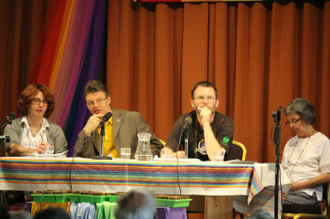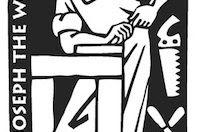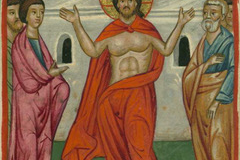Calls for a new approach to politics at NJPN conference

Panel discussion l-r: Cllr Theresa Byrne, Simon Barrow, Fr Martin Newell, and Pat Gaffney
Around 300 participants gathered at Swanwick this weekend for the National Justice and Peace Network's annual conference. The theme: 'Justice, Power and Responsibility; How Can Democracy Work for the Common Good?' had been chosen two years ago, but could not have been more relevant - given recent events.
The main speakers were: Jon Cruddas Labour MP for Dagenham and Rainham , Jenny Sinclair of Together for the Common Good, Polly Jones of Global Justice Around, Takura Gwatiyanya of Caritas Harare and Simon Barrow from the think tank Ekklesia.
Mr Cruddas opened the conference with a call for the creation of a virtue-based politics based on the common good - a more holistic vision of a person living in society, as part of community - rather than simply a commodified being, judged almost entirely on a transactional basis of money exchange.
He said the Catholic Church is uniquely placed to enter the public square on these issues, with Catholic Social Teaching providing the blueprint for the development of such a virtue based model. "The virtue based model of justice can rehabilitate the political sphere," said Cruddas.
Jenny Sinclair, founder and director of Together for the Common Good, called for the establishment of a relationship based model grounded in the common good. "After Brexit we need an examination of conscience " she said .."It's time to climb out of our silos and see what else is going on - looking across sectors, and ecumenically - from parish to boardroom.'
The special role of the Church is to encourage relationships between estranged groups, she said. "We must be clear where our centre of gravity lies - transcending party politics."
Calling for politics with primacy of the human person in relation with others, Jenny Sinclair said: "It's in my interest that you thrive." She said a challenge of working for the common good meant being prepared to work with any and everyone, from whatever walk of life. "It starts with conversation. Locally, by people talking to each other. I cannot create the common good on my own, or by just talking with friends. To build a common good requires people who may disagree, and whose interests and circumstances are different, to encounter each other in relationship. The results are surprising, It's kind of alchemy," said Sinclair, who stressed that the demand was all the more pressing since the EU referendum, which had highlighted how polarised and excluded large parts of the UK have become. Echoing Cruddas, she asked whether "our notion of justice has come down to handing out bits of money."
Jenny Sinclair said the Churches are well placed to play "a special role in strengthening civil society... We can foster a culture of encounter, where people of different experience meet - at all levels and in all sectors. We can build the links between local institutions and between estranged groups," she said, reminding the audience how her father Bishop David Sheppard and Archbishop Derek Worlock had played just such a role a generation ago.
Sinclair praised organisations promoting the common good in the world today, such as Citizens UK, the Church Urban Fund and the Catholic Worker movement. She concluded by saying that on an individual level we can all invest ethically.
"The biggest barrier to solving world poverty is the rapacious behaviour of big corporations, " said Polly Jones, head of campaigns and policy at Global Justice Now. She went on to outline the dangers of the Transatlantic Trade and Investment Partnership (TTIP) which would enable corporations to sue governments if they do something that cuts profits. "Under a similar agreement, the Egyptian government has been sued by waste and energy company Veolia, after it brought in a minimum wage. This was deemed to eat into profits.
Polly Jones warned of the possible implication for the common good in terms of how these agreements can bite into public service provision.
She described how the idea of trade agreements like TTIPS were born out of the financial crash of 2008, being sold by corporations as a way of enhancing growth in the world economy. "It has been about carving out new markets in areas where they were not able to trade before," said Jones.
She also pointed to examples of how TTIPs and other such agreements being resisted, with 250,000 Germans coming onto the streets recently to protest about the agreement. "We have to find a way to enforce our standards on the corporation and cut their power," she said.
Besides the keynote speakers, there was a range of workshops on finance, media, campaigning, and women's issues. There were also activities for children and young people, and a panel discussion with Ealing Cllr Theresa Byrne, Simon Barrow, Fr Martin Newell and Pat Gaffney from Pax Christi.
Mass was celebrated by Passionist priest Fr Martin Newell with music provided by an ad hoc group of singers, including five children, guitarists, violinists, flautists and a saxophonist, from several dioceses who played and sang beautifully - including a new setting for the psalm, composed by Sheena Field from St Hugh of Lincoln parish, Chesterfield.
On Sunday, Takura Gwatinyanya gave a moving account of his work in Zimbabwe with Caritas. The humanitarian NGO works in collaboration with local partners in a number of health, water, agriculture and food security programmes, as the country struggles to cope with extreme drought and economic hardship.
Alison Gelder from Housing Justice led the final 'action planning session' before the conference ended with a lively liturgy - accompanied by a film made by the children and the youth group.
See ICN for more reports and texts from the talks later this week.





















